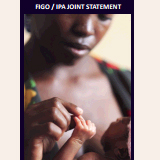
The International Federation of Gynecology & Obstetrics (FIGO) and the International Pediatric Association (IPA) have released a Joint Statement on the prevention and treatment of preterm births, outlining the role that obstetricians and paediatricians have in the prevention and treatment of preterm births.
Proven Interventions Save Lives
Almost one million babies can be saved per year if interventions with proven benefit were to be made universally available to women and their babies by 2025 (covering 95% of those at risk).
Prevention and management of preterm birth requires close collaboration between all cadres of health workers, obstetricians and paediatricians with midwives and neonatal nurses. Evidence-based interventions to prevent preterm births and reduce death and disability among preterm babies have been identified, now it is time to act.
Role of Obstetricians
Many of the interventions to address preterm births are also well recognized for their benefits for fetal wellbeing and maternal health. Measures to be advocated for and implemented by the obstetrician include:
-
Behavioral and community interventions to reduce smoking, prevent violence against pregnant women, and address other social stressors linked to increased risk of preterm delivery.
-
Prevention of iatrogenic, multiple pregnancy
-
Promotion of adequate spacing between pregnancies
-
Antenatal care packages for all pregnant women and identification and treatment of pregnant women at higher risk of preterm birth
-
Avoiding unnecessary induction of labor or caesarean section
-
Provision of progesterone for prolonging pregnancy when appropriate and interventions for structural abnormalities
-
Diagnosis and management of women in preterm labor with antenatal steroids and tocolytics
-
Use of antibiotics for PROM to increase survival chances of preterm baby
-
Strict infection control at preterm birth
Role of Paediatricians
In the event of a preterm birth, implementing key evidence-based interventions can save lives and improve outcomes. Working with midwives, nurses and others, paediatricians should help ensure:
-
Essential newborn care for all babies, including thermal care, exclusive breastfeeding and infection prevention
-
Neonatal resuscitation, as required.
-
Extra care for small babies, including Kangaroo Mother Care and extra support for feeding and extra care for preterm babies with complications
-
Management of babies with signs of infection
-
Safe oxygen management and supportive care for babies with respiratory distress syndrome
-
Management of babies with significant jaundice
-
Hospital care of preterm babies with respiratory distress syndrome and, if appropriate and available, nasal CPAP and/or surfactant
-
Neonatal intensive care
Together, rapid change is possible
Together, as professionals, as policy-makers and as parents, we commit to our common goal: all pregnancies wanted and healthy, all women survive, and all babies – including those born too soon – with a healthy start in life, and thriving as children, fulfilling their potential as adults. The actions, research and innovation for preterm birth would improve reproductive and maternal health, reduce disability and chronic disease and build sustainable health systems.
- Download a brochure of the Joint Statement
- 15 million babies are born preterm each year – learn more
- Read the Born Too Soon report